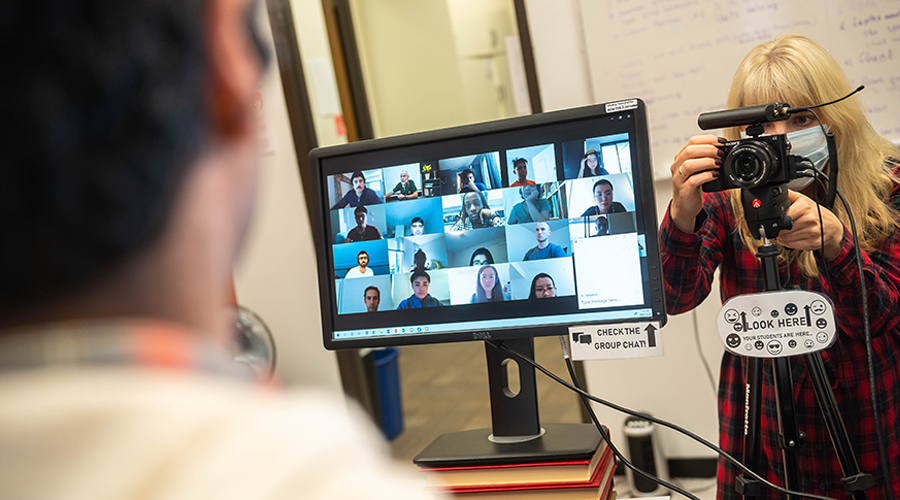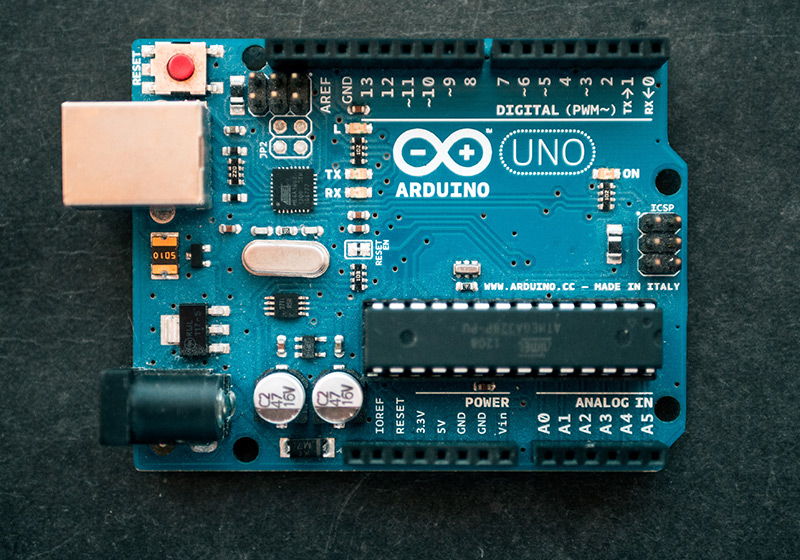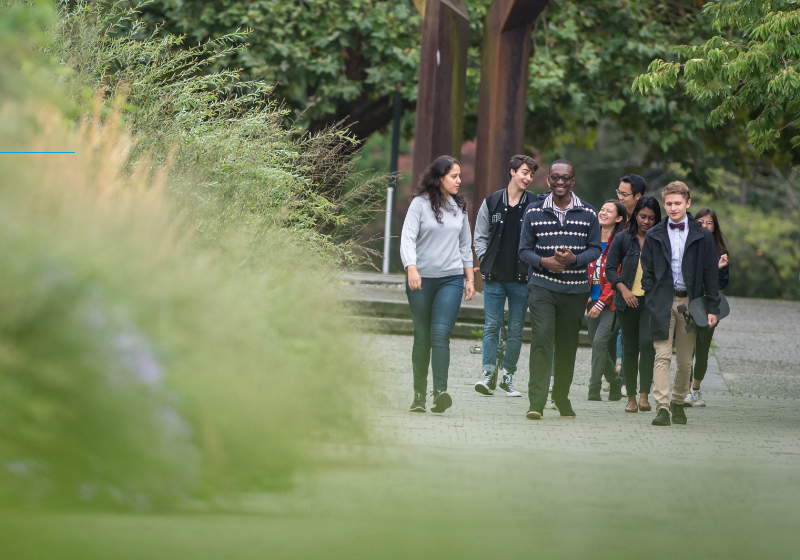
Bringing compassion to the online learning environment

We are not choosing to work, teach, and learn from home, notes the introduction to the first high-level principle in the Guiding Principles for Online Course Adaptations. When students, faculty and staff at UBC had to transition from life on campus to a mostly remote, online university, we found ourselves in uncharted territories. Instructors had to re-imagine how to share their knowledge differently, while students had to cope with a new definition of what life at a university looked like. The truth is: nobody knew what to expect.
Yet, it did not stop instructors and program supervisors from doing what they love — helping students reach their goals — by relying on two important human values: compassion and care.
Showing compassion to others and oneself
It’s impossible for anyone to instantly be an expert at something they’ve never tried before. However, admitting this fact and showing compassion and care for everyone, including yourself, is an important first step.
Christine Klaray, director of student services in the Faculty of Land and Food Systems, refers to compassion and care as a starting point in helping her students thrive. “The students are who we serve. The work that we do is in their best interest and aims at supporting them to be successful. It was important to me and my team to remain flexible to adapt as new needs arise, as well as to admit when we didn’t get it right the first time.”

Teaching was a different experience both for students and instructors
For Dr. Jackie Stewart, associate professor of teaching in the Department of Chemistry and deputy academic director at the Centre for Teaching, Learning and Technology (CTLT), the logical way to address the challenges she was facing with the move to remote teaching was to be completely open with her students. “Right way, I told them that I was not going to claim that I had everything figured out about online teaching. I talked about the choices I made, why I was making them, and I was very open about letting them voice their opinions so we could learn and build a sense of compassion and trust towards each other.”
Jackie notes that previously many departments have had a culture of strict accountability, which this disruptive period has shown can be softened and made more flexible — such as implementing a no-questions-asked extension policy. “We are teaching real people who have real concerns,” she notes. “And it went fine!” She adds: “this was a huge revelation for me, and definitely something that I will keep moving forward.”
When she saw that compassion and care were featured first in the Guiding Principles for Online Course Adaptations shared by the university, she knew she was doing the right thing. “It really helped me embrace this idea because I saw that it was an institutional priority, that I would be supported as an instructor in treating my students this way.”
A very different teaching and learning experience
Before March 2020, Jackie would spend most of her time on campus, between her office and the classroom. “I would often bring Scottie, my dog, who would go greet all the students and then sleep at the front of the class.” A very approachable person by nature, Jackie was nonetheless surprised by how different the teaching experience felt this time around.
“The pandemic made teaching more personal. We are not just people passing in a lecture hall anymore — we are in each other’s homes, which is a very personal thing.” If the experience was a shock for experienced instructors, it was even more so for students in their first year at UBC.
To ease new students into such a different environment, the Faculty of Land and Food Systems created Reach Out Orientation Transition and Study Skills (ROOTSS), a coordinated program that supports them through their first year in the faculty. It is built as an online platform where they can find all the information they need through activities (workshops, events, complementary curriculum) and use it as an avenue for them to get to know each other. This program was originally planned to launch in May 2021 but was sped up to be ready a year in advance to accommodate the situation.
Despite this quick turnaround, Christine was surprised by how engaged students were, and the sense of community they embraced right from the beginning. “We were grateful for the appetite new students had to connect, engage and have a platform to share their excitement about coming to UBC. We built the structure to encourage this of course, but we were impressed by how they started to connect organically with one another. Their engagement did not drop off after our launch in June 2020.”
Yet, both Jackie and Christine agree that first-year students are still getting a very different experience than they usually would. As Jackie sums up, “I am really impressed with how they engage with the class, the content and each other, but they also don’t know what they are missing.”
Teamwork at the service of students
While both Jackie and Christine put their time and energy into supporting their students, they were also both quick to point to the support they received — and in particular, how students employed in support roles played a major role in the collective efforts needed to transition online.
Jackie was not alone in front of her computer and could count on Taylor Wright, her teaching assistant (TA), for real-time support. “Having a TA be an integral part of the class was one of the great things about teaching online,” she explains. “We used a team-taught approach that was helpful to meet our students’ needs. For instance, he would let me know when I’d need to emphasize a point during lectures, which the students really appreciated. We tried to make it interactive and fun.” This teamwork was greatly appreciated by her students — Jackie proudly shares that student feedback reported that the class “felt like a regular class”.
Christine could not be prouder of what the LFS Student Services team achieved in such a short time. “I feel very privileged to work with such exceptional and dedicated individuals. Because of our student-centric approach, we created content in a very intentional way.” She was also grateful that she could count on a co-op student thanks to support from the Teaching and Learning Enhancement Fund (TLEF), whose primary role was to develop resources and make sure the ROOTSS program was hitting its milestones. “It was a real collective effort,” she adds, “with support coming all the way up to the dean. We created a curriculum that was overwhelmingly appreciated by our students, which was the most important.”
This past year was the perfect example of what flexibility in teaching can accomplish when viewed through the lens of compassion and care. Because Jackie and Christine wore these values on their sleeves, they accomplished what few of us would have thought possible one year ago: using online as the primary avenue for delivering high-quality experiences for students living all over the world. Thanks to the support from their teams and other participating units — such as the CTLT, the LFS Learning Centre and Skylight Science Centre for Learning and Teaching — they created new ways of sharing knowledge that will change how teaching is delivered forever.
Looking back, both Christine and Jackie are convinced that when it is time to come back to campus, the lessons learned will improve the teaching and learning experience. “I am excited to get back to campus,” concludes Jackie. “In a way, I am glad that this situation pushed us to evolve a little faster than we normally would. The only way to go is forward, and it will be very interesting to see.” And with compassion and care for everyone as a founding principle, great things can happen.
More stories
The transition to online: One year later
To introduce the series, Associate Provost, Teaching and Learning Dr. Simon Bates and Provost Office Fellows in Online Learning Dr. Catherine Rawn and Kieran Forde reflect on UBC’s transition to online teaching.
Sharing community values from a distance
The Haida Gwaii Institute team explains how they relied on their community values to provide experiential and transformative learning opportunities from a distance.
Experiential lab learning: stories from a year of online teaching
In this story, three instructors from the Faculty of Science explain how they took the challenge of online teaching and turned it into an opportunity to experiment with learning.
Finding the human side of virtual teaching and learning
Like many, before 2020 Christine Evans had never taught online. Just two months later, she was championing the possibilities of digital spaces. She shares what she thinks changed for the better.
Bridging the accessibility gap through Universal Design for Learning
In this story, two instructors with previous experience with online teaching share their experience and tips on the key aspects to consider when implementing Universal Learning for Design (UDL) into a course.
Rewarding integrity: Changing the conversation on cheating
In this story, Dr. Laurie McNeill shares the personal journey that took her from “busting cheaters” to a more educative approach to academic integrity.






